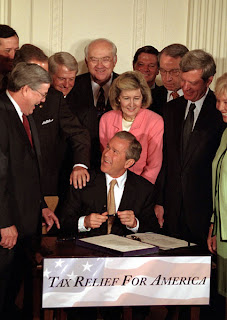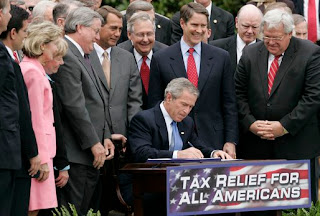When companies in Colorado take nonrenewable resources out of the ground (such as coal, gold, oil and natural gas, but mostly from natural gas), they pay a severance tax in order to compensate the state for the permanent loss of those resources. This is on top of the income taxes, property taxes, sales taxes, etc., that they pay to do business in Colorado. The rate is between 2% and 5%, but with tax credits and exemptions it actually works out to an average rate of 1.3%. This is the lowest effective severance tax rate in the large-producing western states region.
The revenue gained from the severance tax is split evenly between the local governments affected by the extraction and several state programs. The bulk of the state money is spent on water projects, but some of the revenue is spent on wildlife conservation, low-income energy assistance, invasive species such as pine beetles and zebra mussels, soil conservation, renewable energy, and a few other priorities.
With the current energy boom, severance tax collections are expected to increase significantly in the next few years, although of course there are no guarantees.
There are two measures on the Colorado ballot this year that would affect the severance tax, and they need to be considered together. In fact, if both pass, there are contradictory provisions and it is not clear how they would be resolved.
Amendment 52 is a constitutional amendment, which means its provisions would likely prevail in court and would be harder to change. It would not impact the money provided to local governments. But in the portion allocated to state programs, the amount spent on current priorities would be capped at the prior year's amount plus inflation, and the remainder would be allocated to transportation projects. Within these transportation projects, special emphasis would be placed on reducing congestion on I-70, the major east-west highway in the state that provides the majority of access to the mountain resorts.
So, this amendment would be enshrined in the constitution, making it impossible to change without another vote of the people. It would potentially conflict with and trump another legally passed measure. It would remove revenue from a number of important state spending priorities. Some of there priorities are likely to need more money because of rising energy costs and global warming, such as water projects (global warming is predicted to increase droughts in this state), invasive species (pine beetles have already laid waste to the pine population on the Western Slope and have begun to make their way through the Front Range), renewable energy, and low-income energy assistance. And it increases spending on roads, which will only exacerbate the energy and global warming issues. Not only that, by focusing on a single transportation corridor, I-70, the interests of most of the state or ignored for the benefit primarily of the ski industry.
Oh, and once the state legislature sees this new revenue stream for transportation, what's to stop them from decreasing its allocation from the general fund?
I don't see a single reason to vote for Amendment 52.
Amendment 58 approaches the severance tax issue from a different angle. First, it increases the effective severance tax rate by making three changes. Currently, companies can apply a large chunk of their property taxes to effective eliminate a big chunk of the severance tax, and this amendment would eliminate that tax credit. The amendment applies the severance tax to a number of smaller wells currently exempted. And it changes the multi-level tax rates (between two and five percent) to a single level (five percent), while exempting smaller companies from the tax.
Plus, Amendment 58 is a statutory amendment, meaning that the state legislature can adjust this as necessary when things change over the years.
So far so good. There really is a cost to the state when companies permanently extract natural gas from beneath our ground, and companies are largely not paying that cost. This measure would fix that. Even after the increases, our effective severance tax rate would remain the third-lowest among the large-producing western states. Nobody is going to stop drilling or significatly raise natural gas prices.
Amendment 58 also changes how the severance tax revenues are spent. Sigh. I knew this wasn't going to be so easy.
Amendment 58 takes 44% of future severance tax revenues and splits them according to the old formula. According to projections, over the next four years, these older priorities should get about the same amount of money as they do today (because the expected increase in extraction and the increased effective tax rate would make up for the loss of 56% of the total income).
This 56% would be split among a new set of priorities. Most of the money, 60% would be applied to a new fund providing college scholarships to low and middle income Colorado residents. The remainder would be spent on wildlife habitat, energy efficiency and renewable energy, transportation projects in areas affected by the oil and gas industry, and small community waste water and drinking water projects.
Who can argue against college scholarships, especially given that the state has hugely cut spending on higher education? The other priorities all seem good. It is more earmarking, but at least we're earmarking a revenue stream that has historically already been earmarked.
So, this one has a new revenue stream I can live with and reasonable, albeit earmarked, priorities. And some of the new priorities actually help with energy and climate change issues, which is where the severance tax revenue should be spent if it has to be earmarked.
Vote NO on Amendment 52.
Vote YES on Amendment 58.
And, whatever you do, don't vote for both of them!
Labels: climate, Colorado, education, election 2008, energy, environment, politics, state legislature, taxes, transportation
 One of John McCain's biggest campaign issues this election, and a favorite talking point among conservatives is the so-called Obama tax increase. But what I don't get is why they are blaming Obama, when it was their own man George W. Bush who signed the tax increase into law.
One of John McCain's biggest campaign issues this election, and a favorite talking point among conservatives is the so-called Obama tax increase. But what I don't get is why they are blaming Obama, when it was their own man George W. Bush who signed the tax increase into law. And now the conservatives are blaming Obama for raising taxes even if he does nothing and lets some of the tax cuts expire. That's just plain dumb. George W. Bush and the Republican Congress are totally responsible for raising taxes.
And now the conservatives are blaming Obama for raising taxes even if he does nothing and lets some of the tax cuts expire. That's just plain dumb. George W. Bush and the Republican Congress are totally responsible for raising taxes. So, Bush is a tax hiker. And we already know that John McCain is as well.
So, Bush is a tax hiker. And we already know that John McCain is as well. Barack Obama is proposing to follow the Bush tax plan -- letting the Bush tax cuts expire as Bush put into place. Meanwhile, John McCain has proposed a brand new tax (his tax on health care benefits). But don't worry, he tells us, it will only be a net increase on 5% of people, the people who can most afford it.
Barack Obama is proposing to follow the Bush tax plan -- letting the Bush tax cuts expire as Bush put into place. Meanwhile, John McCain has proposed a brand new tax (his tax on health care benefits). But don't worry, he tells us, it will only be a net increase on 5% of people, the people who can most afford it.



